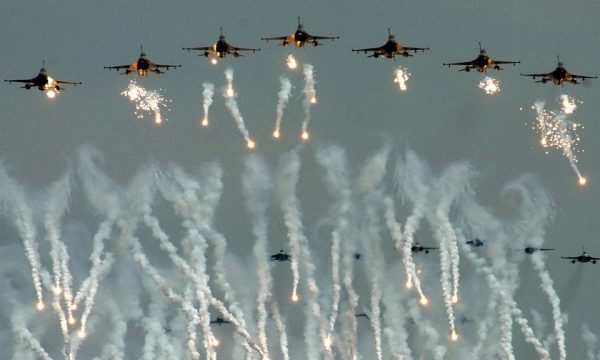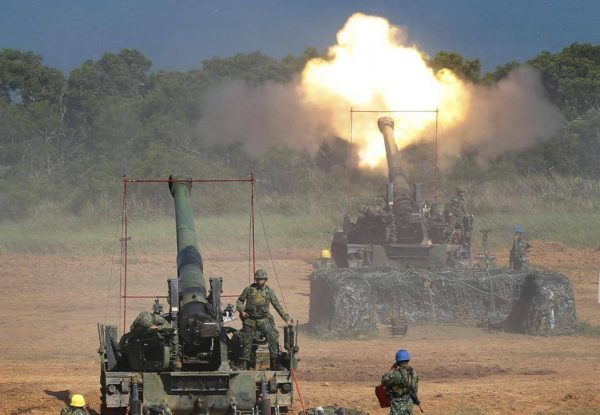Taiwan is ramping up preparations for the upcoming Han Kuang military exercises.
Han Kuang is a massive military-wide drill that takes place in the late spring annually in Taiwan, to simulate an invasion from China and how the military will rebuff attacks.
According to reports from government sources, the drills will begin on April 30 with computer aided war games, and will then shift into live-fire exercises through June 8, 2018.
This year’s maneuvers will have some unique features. Coast Guard Administration (CGA) vessels and National Airborne Service (NAS) Corps aircraft will participate in the drill for the first time in order to test joint combat capabilities with other branches.
Additionally, non-military elements will have parts in the drills. For the first time civilian UAV companies and their operators will join military units for the live-fire drill. Civilian construction companies will also take part in the drill to simulate the repairing of airstrips after being hit by Chinese airstrikes. “It’s not just soldiers’ duties to protect the country” said a defense ministry spokesman commenting on this decision. “Everyone has the responsibility since our defense budget is limited.”
The Han Kuang drills will come just as China completed naval maneuvers in the Taiwan Strait. Taipei dismissed China’s military exercises last week as “routine” after the expected large-scale naval drills failed to materialize. Officials called it “cheap intimidation” and mere “sabre-rattling.” While Taiwan may look down on China’s recent drills, in truth, the exercises did consist of a small flotilla of vessels that conducted live-fire simulations, all clearly designed to intimidate China’s neighbor.
These back-to-back drills by the rival nations underscore the tensions that have been building between Beijing and Taipei over the past several months. These tensions have been driven by two important factors, both of which have had important implications for the geopolitical balance, not just in the region, but for the world at large.

Big Power Competition
A major factor in global security that nations have been rudely awakened to lately is the reemerging of great power competition, with the United States pitted against its communist adversaries, China and Russia. Under cover from America and the West’s obsession with the War on Terror over the past decade and a half, these two countries have been able to more flexibly increase military power and extend themselves politically into more diverse regions. China specifically has made tremendous headway in fomenting alliances with a wide spectrum of countries. These advances have come with both economic and military footholds in diverse regions, most recently including sub-Saharan Africa.
China has also advanced its military by leaps and bounds over the past several years. The additions to China’s military have not only consisted of improvements to traditional hardware, but also the introduction of whole new fields of technology into their military repertoire. China’s accomplishments in the field of smart weapons that incorporate AI into offensive and defensive platforms have been the most concerning, so concerning as to prompt a United States Congressional hearing into the issue. The shift in focus of U.S. defense strategy toward the development of new-age weapons and non-conventional platforms has in large part been a reaction to China’s emergence as a formidable military adversary.
While the U.S. has certainly felt the threat of China’s advances, China’s Taiwanese neighbor has experienced the most alarm. Ever since the communists came into power, Taiwan has been viewed by the Chinese government as a renegade province of the People’s Republic. American patronage, both politically in the form of diplomatic support, and militarily via substantial arms sales, has to a great extent softened much of the threat posed by China. But in watching the PRC grow more and more bold, with greater military prowess and increasingly broad geo-political reach, Taipei has no doubt had some concerns about its ability to face Chinese aggression. Indeed, the Han Kuang, which is essentially a yearly emergency drill to prepare for a Chinese attack, has expanded notably in the past two years.
In 2016, new units that had never taken part in the exercises, such as the National Airborne Service Corps, played roles for the first time. The following year, Han Kuang was expanded into two distinct stages, and featured simulations that reflected actual advancements in China’s military buildup. These included scenarios of China deploying aircraft carriers, stealth warplanes, and advanced surface-to-surface missile systems. The novel additions that will be present in this year’s Han Kuang are a continuation of this trend, tailoring drills to address actual threats developing within the Chinese military today.

Change in the Status Quo?
The factor most responsible for maintaining a semblance of stability in the China-Taiwan conflict has been consistent neutrality by much of the world on the sensitive issue of Taiwanese sovereignty. Even the United States, which has been by far the most supportive country for Taiwan over the past five decades, has never advocated for official independence and has stood fast to its official “One China” policy. Last month though, there seemed to be a shift in the status quo regarding America’s position on the sovereignty question. On March 16, President Trump signed a piece of legislation that promoted meetings between American and Taiwanese diplomats. The Taiwan Travel Act triggered outrage in Beijing, even prompting Chinese officials to threaten a military response. The Travel Act was especially troubling to China in light of the growing influence of voices in Congress over the past several years promoting full recognition of Taiwan. It is a fact that a growing number of Senators are arguing that current guidelines for U.S.-Taiwan relations are outdated, and the United States should move toward normalizing ties with the country.
With this combination of sensing growing support for Taiwanese independence, along with increased military capabilities, it is not surprising that China has been executing more and more military displays, all less than subtle in their threatening message. Chinese officials recently made it clear that the increased frequency of their drills was to threaten any action by Taiwan or the international community to move toward independence. In a recent statement, Ma Xiaoguang, spokesman for China’s Taiwan Affairs Office told media sources that China has “the resolute will, full confidence and sufficient ability to foil any form of Taiwan independence separatist plots and moves and to defend the country’s sovereignty and territorial integrity.”
Seen in context, this year’s Han Kuang is not just the yearly drill it’s been in years past. The exercises are Taiwan’s response to China’s aggression and threats. They will likely serve to escalate the already tense schism between the two countries, raising the chances of an actual confrontation.
The Korea Factor
The prospect of an actual military clash between China and Taiwan is bad enough. In addition to this, however, there is another very important global security issue, very strongly tied to keeping China placated.
The possibility for achieving a lasting stability between North and South Korea, and perhaps even denuclearizing the tyrannical Pyongyang government, would be one of the biggest diplomatic achievements of the past sixty years. Progress in bringing peace to the Korean Peninsula has been well underway for some time. While the president was blasting North Korea’s leader Kim Jong Un with childish name-calling a few months ago, now that there is a potential peace summit on the table for the near future, Trump is praising the North Koreans for their “very honorable” behavior. True, changes in the whimsical rhetoric of Donald Trump hardly form an accurate yard stick, but it does give some perspective on how drastically the situation has shifted.
China has been an important element in pushing this process forward. China has considerable leverage on North Korea, accounting for almost all of the country’s foreign trade, and being its biggest energy provider. Because of China’s unique position, it has been instrumental in keeping the pressure on North Korea to move toward reconciliation. A conflict erupting in the China Sea between the People’s Republic, Taiwan, and possibly even the United States to some degree, would be incredibly disruptive to this process.
With all of the factors connected to how smoothly the upcoming Taiwanese drills transpire, the most we can hope for is that cooler heads will prevail.
















